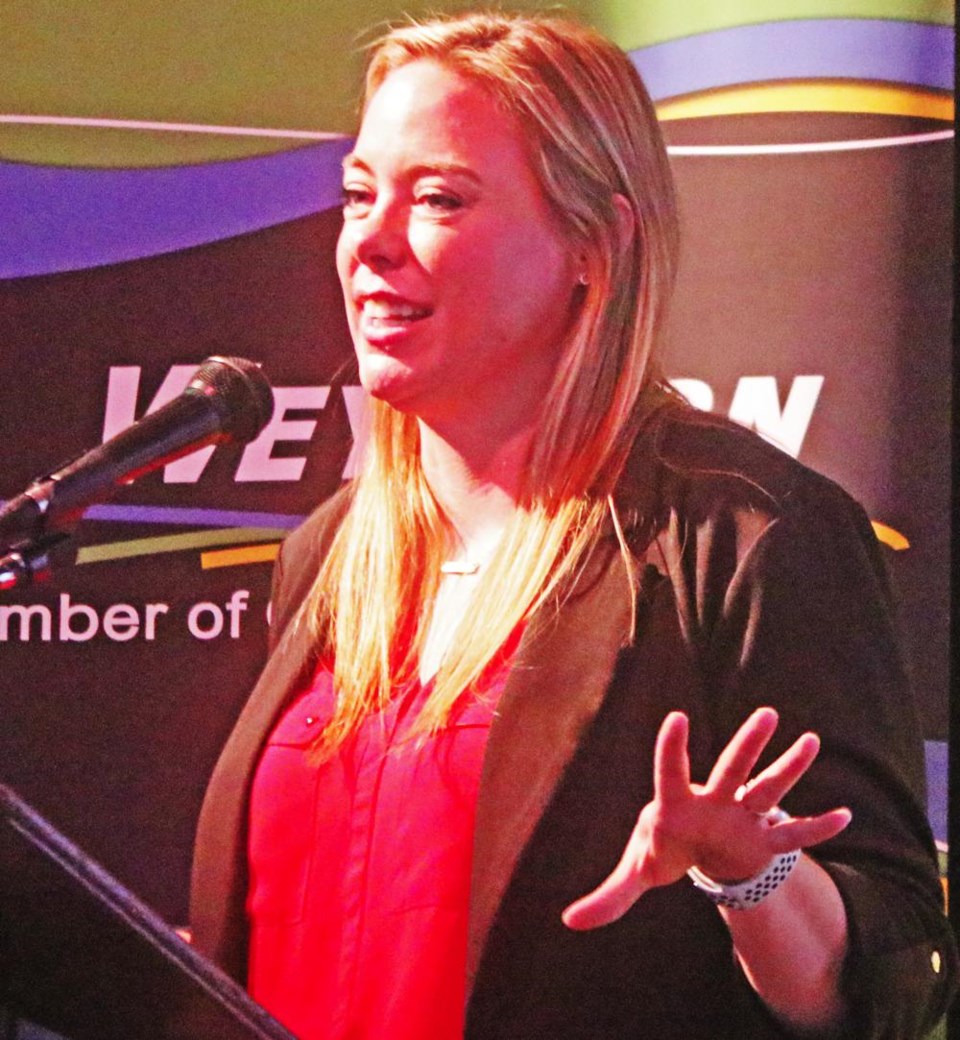WEYBURN – Producers are the best people to be telling their own stories of how food is grown and produced, and they should tell those stories in a format or on a platform that best suits them, said farmer and agriculture advocate Adrienne Ivey.
She was the guest speaker at the recent Agriculture Appreciation Night hosted by the Weyburn Chamber of Commerce at McKenna Hall.
Based in Ituna, she is well-known around the province for her posts on Facebook, twitter and Instagram, and passed on some advice to help farmers understand how and why they should reach out and help put agriculture in a positive light.
“The only time it’s a waste of time is when we make enemies by the way we’re speaking instead of building bridges. I honestly believe agriculture is one of the most misunderstood industries, but it’s also one of the most noble professions. It deserves people like me or like so many of you to speak up for it,” she said.
She didn’t come from a political family, but she did see an opportunity in Saskatchewan for agricultural producers to speak out and put the right information out through social media, to counter the misinformation in the media.
Ivey commented that communication is everything, “especially now that we’ve come through the pandemic, and so much of our lives were online.”
Taking the well-known phrase, “a picture is worth a thousand words”, she said in these days of social media, “a 10-second video is worth a million words. Words is what drew me to communications. I love pulling a story together, but really words aren’t very efficient any more. If we want to capture people’s attention, short effective videos are everything.”
The reason videos, and photos, are good tools is there is nothing more powerful than a well-told story, said Ivey. “The thing about stories is it’s important who the storyteller is. I’m on a lot of journalist media lists, and they’ll call me on an agriculture story. But, I’m not the right storyteller for these stories. It’s an opportunity to use my network, so I can find other people who are great to tell those stories. Just because I’m in agriculture, doesn’t mean I’m the right person. … We are each the best person to tell our own farm stories.”
She also pointed out the best way to implement change in people’s perceptions is to amplify the right voices, the accurate voices, to tell the right messages to the non-agricultural consumer world.
Ivey noted a number of people she follows on various platforms, making note of a young girl who posts videos, “Learning about Ag with Maddy”, as well as the photos of Fillmore local, Sarah Leguee, as just two examples.
Above all, said Ivey, you have to make it fun when putting stories out there from your farm.
“If it’s not fun, people can feel that, and it’s no longer authentic or full of passion. Also, don’t get caught up in the numbers. Honestly, people get so caught up with how many followers they have, with the algorithms. It does not matter,” she said.
Her best numbers are on twitter, but she said she’s found it’s a lot of preaching to the converted, “and we’re just yelling back and forth that ag is awesome. We already know that.”
One word of advice was, “I don’t care what it is, when you’re trying to drive change in anywhere, don’t be an ass. So many of us forget the age-old advice, ‘you catch more flies with honey’.”
Another thing to watch for with social media, said Ivey, is “don’t feed the trolls”, and gave an example of one person who posted as “Farm 365”, with a different photo every day from their farm operation. This worked well until activists started posting nasty things online.
“I could spend a whole evening going back and forth with an activist or a vegan extremist, but all this did was feed their fires. It was a waste of my time, but it actually actively made things worse. Once I stopped engaging completely, they went away,” said Ivey. “It was a miracle cure.”
What she has found is that consumers want the truth about what farming is all about, but during the pandemic the amount of misinformation online was just huge, including marketing-driven misinformation.
“It’s our job to share actual stories from our farms,” she said.
People also need to be more open to other ways of doing things on a farm or ranch, and other points of view.
She noted that some things that used to be impossible to do, are now the new reality. For example, a good part of her presentation was done on her phone, but a few years ago that simply wouldn’t have been possible.





